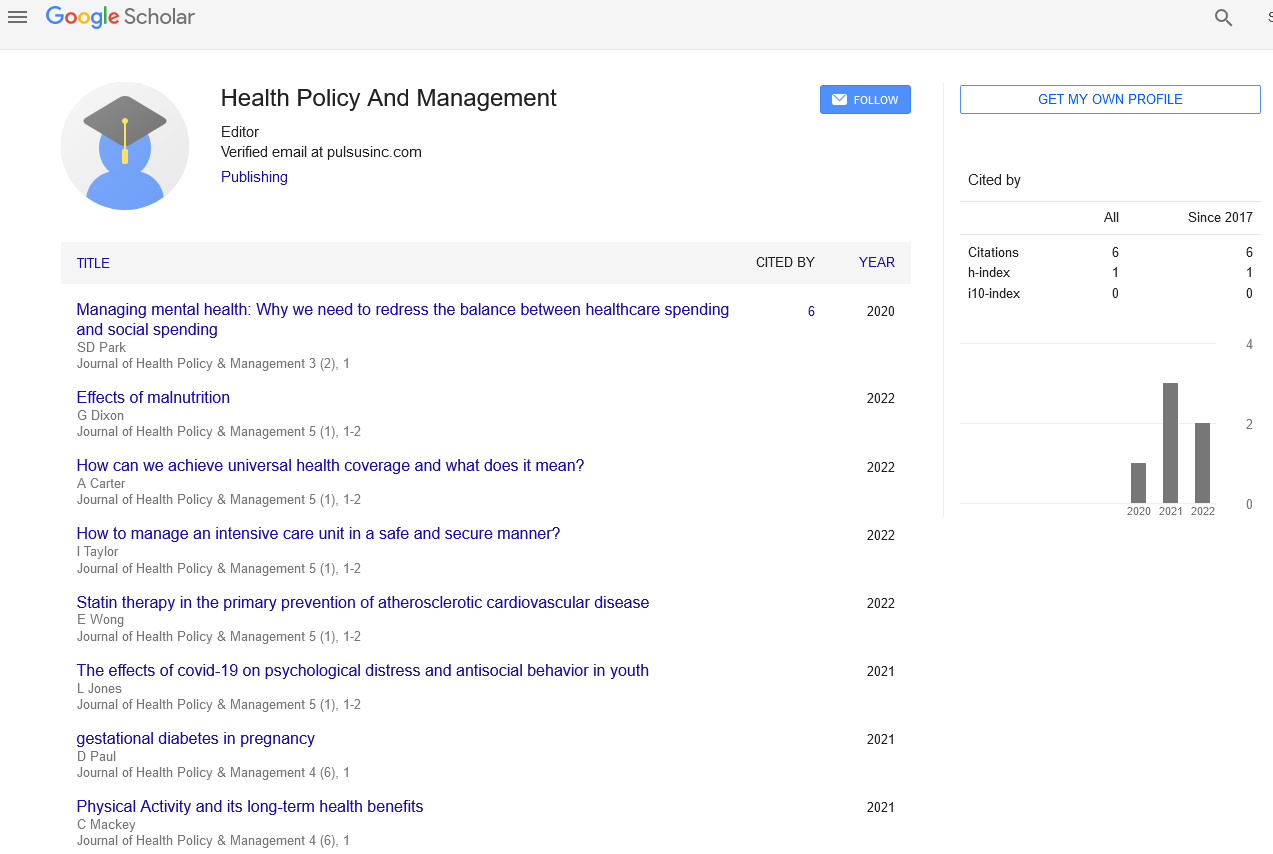Dengue fever: A viral threat
Received: 01-Oct-2021 Accepted Date: Oct 15, 2021; Published: 22-Oct-2021
Citation: Doyle J. Dengue fever: A viral threat. J Health Pol Manage 2021;4(5):1.
This open-access article is distributed under the terms of the Creative Commons Attribution Non-Commercial License (CC BY-NC) (http://creativecommons.org/licenses/by-nc/4.0/), which permits reuse, distribution and reproduction of the article, provided that the original work is properly cited and the reuse is restricted to noncommercial purposes. For commercial reuse, contact reprints@pulsus.com
About the Study
Dengue is a notably endemic infectious disease of the tropical countries and is rapidly turning into a global burden. It is resulting from any of the four serotypes of dengue virus and is transmitted inside human beings via female Aedes mosquitoes. Dengue disease varies from mild fever to extreme conditions of dengue hemorrhagic fever and shock syndrome. Globalization, increased air travel, and unplanned urbanization have brought about increase in the rate of infection and helped dengue to expand its geographic and demographic distribution. Dengue viral infections are one of the most serious mosquito borne diseases in the world. They can be asymptomatic or may also give rise to undifferentiated fever, dengue fever, dengue hemorrhagic fever (DHF), or dengue shock syndrome. Annually, one hundred million instances of dengue fever and 1/2 of one million instances of DHF arise worldwide. Dengue virus is transmitted with the aid of using female mosquitoes particularly of the species Aedes aegypti and, to a lesser extent, Ae. albopictus. These mosquitoes also are vectors of chikungunya, yellow fever and Zika viruses.
Dengue is widespread all through the tropics, with local variations in danger influenced with the aid of rainfall, temperature, relative humidity and unplanned rapid urbanization. Dengue is resulting from a virus of the Flaviviridae family and there are 4 distinct, however closely related, serotypes of the virus that cause dengue (DENV-1, DENV-2, DENV-3 and DENV-4). Recovery from infection is thought to provide lifelong immunity against that serotype. However, cross-immunity to the other serotypes after healing is only partial, and temporary. Subsequent infections (secondary infection) with the aid of different serotypes increase the danger of developing severe dengue. Dengue has distinct epidemiological patterns, related to the 4 serotypes of the virus. These can co-circulate inside a region, and certainly many countries are hyper-endemic for all 4 serotypes. Dengue has an alarming effect on each human health and the global and countrywide economies. DENV is often transported from one place to some other through infected travelers; when susceptible vectors are found in those new areas, there may be the capability for local transmission to be established.
Dengue viruses are spread to human beings via the bites of infected Aedes species mosquitoes (Ae. aegypti or Ae. albopictus). These are the same types of mosquitoes that spread Zika and chikungunya viruses. These mosquitoes normally lay eggs close to stagnant water in containers that keep water, like buckets, bowls, animal dishes, flower pots, and vases. These mosquitoes choose to bite human beings, and live both indoors and outside near human beings. Mosquitoes that spread dengue, chikungunya, and Zika bite during the day and night. Mosquitoes emerge as infected when they bite someone infected with the virus. Infected mosquitoes can then spread the virus to different human beings via bites.
Dengue may be transmitted through infected mother to child. A pregnant woman already infected with dengue can pass the virus to her foetus during pregnancy or around the time of birth. Dengue fever can only be recognized via blood tests. There isn't any particular treatment for dengue fever. Fever reducers and ache killers may be taken to govern the signs of muscle aches and pains, and fever. The best alternatives to deal with those signs are acetaminophen or paracetamol. NSAIDs (non-steroidal anti-inflammatory pills), which includes ibuprofen and aspirin need to be avoided. These antiinflammatory pills act by thinning the blood, and in a disease with risk of hemorrhage, blood thinners may also exacerbate the prognosis. The spread of dengue may be prevented by Prevention of mosquito breeding, Personal safety from mosquito bites, Community engagement, Reactive vector control and Active mosquito and virus surveillance.





